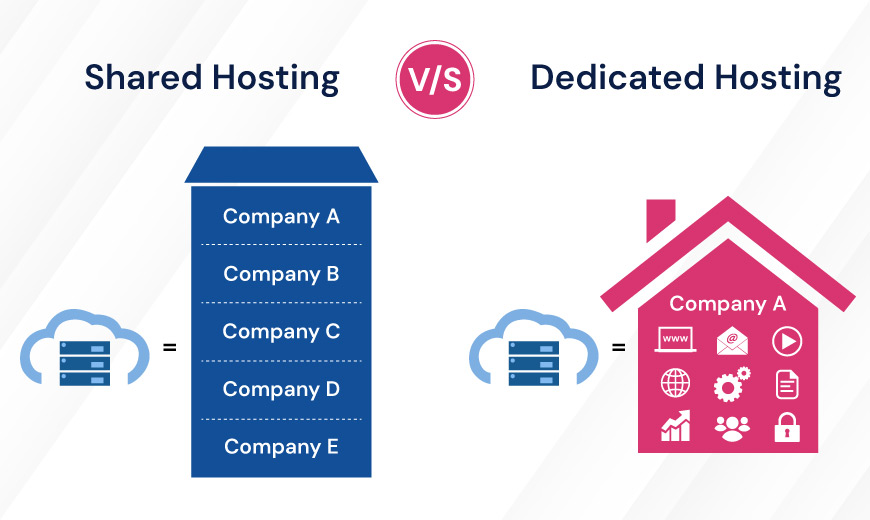Are you wondering which type of hosting is best for your business? Web hosting is a virtual setting that offers a reliable and secure environment for businesses to host their data on the cloud. Shared and dedicated hosting are the two types of web hosting that offer scalable and flexible hosting options for businesses.
In this comprehensive blog post, we will explore the key differences, benefits, and drawbacks of hosting vs dedicated hosting, helping you make an informed decision for your website or online business.
Shared Hosting vs. Dedicated Hosting: Find your perfect match and elevate your online presence.
A] What is Shared Hosting?
Shared hosting is a shared cloud resource that hosts multiple websites within the same server and computing resources. It is a cost-effective solution for businesses with a low user base. It works on the pay-as-you-go model while maintaining an extended range of flexibility and scalability. User can choose CPU, RAM, storage capacity, and bandwidth according to their budget and requirements.
In shared hosting, multiple user’s data are hosted on a single physical server. It works based on the underlying physical resources. When a visitor types any URL in a browser, the browser sends a request to a server that hosts the user’s data. In return, the web server transmits the requested data on the visitor’s screen.
B] What is Dedicated Hosting?
As the name suggests, dedicated hosting is a type of web service that dedicates its entire server and computing resources to a sole client or business. It offers complete control over its resources including CPU, RAM, storage capacity, and bandwidth. Dedicated hosting provides high-customisation and an extended range of optimisation facilities to fulfill unique business needs. It is a highly suitable cloud computing solution for businesses with a high user base and sensitive data.
Dedicated hosting works by offering an entire physical server exclusively for their sole use. It provides the server’s root access, allowing for extensive customisation and security configuration.
C] Dedicated Hosting vs Shared Hosting: Exploring The Key Differences
Choosing the right hosting solution can be a tricky call. That’s why, it is essential to explore the major difference between shared and dedicated hosting before selecting the right hosting model for your business.
1. Performance
Dedicated servers are solely designated to their client with dedicated computing resources. The sole access to its resources offers an exceptional performance with its powerful processing abilities. Dedicated resources are optimised to handle data requests more quickly with reduced latency. Dedicated hosting is renowned for its high performance with faster data loads while offering nearly 100% uptime.
Since shared hosting shares its computing resources among multiple users, it offers lower performance capabilities compared to dedicated hosting. The distributed resources foster lower data loads and increase latency, increasing the bounce rate. A sudden spike in traffic could hamper website performance and negatively impact a business’s brand reputation.
2. Security
Dedicated hosting is renowned for its high-security protocols. The dedicated infrastructure and isolated environment offer a secure and reliable cloud environment. Businesses with sensitive databases can leverage the dedicated hosting’s extended security protocols to host their sensitive data on the cloud in an isolated environment.
When comparing shared and dedicated hosting, shared hosting lags behind in terms of security protocols. It can be an open ground for hackers and poses vulnerability risks due to its shared resources among multiple users.
3. Cost
Since dedicated hosting offers solely designated resources to its users, it requires a comparatively high initial cost. However, customisation options, optimal security measures and high-performance capability benefit enterprises in the long run. Dedicated hosting ensures that visitors get a hitch-free experience without data loading delays.
Shared hosting is renowned for its budget-friendly solution for hosting data on the cloud. It can be a cost-effective solution for businesses with a low user base and minimal security demands. However, shared resources among multiple users can hamper the user experience due to slower loading time and higher latency.
4. Customisation and Control
Dedicated hosting is acclaimed for its extensive customisation and control. Users can control and customise hardware and software as per their requirements in a highly secured infrastructure. It offers highly personalised solutions for businesses, intending to deliver the utmost user experience with a feature-packed and responsive website.
Despite of inexpensive nature of shared hosting, it lacks in offering customisation and control. Limited resources and shared nature eliminate the possibilities of customisation. As the hosting provider is the sole owner of shared infrastructure, it abolishes the probability of user’s control over their data and security.
5. Scalability
Dedicated hosting is highly scalable and offers a highly flexible solution for businesses with growing needs and high-security demands. Its robust and flexible infrastructure provides a scalable solution to upgrade the computing resources as needed.
As the user can expand their computing resources or storage capacity on-demand, shared hosting can be a go-to choice for businesses with a low user base. Shared hosting offers a highly scalable environment for growing businesses with on-demand cloud resources.
D] Pros And Cons: Shared Vs Dedicated Hosting
1. Shared Hosting
Pros:
- Shared hosting is a cost-effective solution for low-user-based businesses and beginners.
- Shared hosting usually offers managed services that look after the maintenance, security, and updates.
- It provides a robust customer support facility and user-friendly control panels.
Cons:
- Due to shared resources among multiple users, visitors may experience slow server response and increased latency.
- As service providers look after all the resource management and security measures, users have limited control over their data and customisation.
- Shared servers are more prone to data breaches because of lesser security measures.
2. Dedicated Hosting
Pros:
- Dedicated hosting offers sole access and authority to optimise their resources according to business requirements.
- While comparing shared hosting and dedicated hosting, dedicated hosting offers excellent customisation facilities. User can customise hardware and software according to their need.
- One of the major benefits of dedicated servers is their excellent performance capabilities. Since dedicated hosting offers isolated and dedicated resources to users, it provides a hitch-free user experience with fast loading time.
- Dedicated hosting is acclaimed for its top-notch security protocols. Isolated infrastructure and sole resource utilisation mitigate any chances of data breaches and offer a secure environment for hosting sensitive business data on the cloud.
Cons:
- The expensive nature of dedicated hosting can be justified by leveraging its exclusive server resources, enhanced performance, robust security and excellent control over server resources.
E] Choosing the Right Hosting For Your Needs
1. Website Size and Traffic
Whether choosing shared or dedicated hosting, assessing your website size and its traffic is essential. Dedicated hosting can be a suitable option for businesses with a high-volume user base and large website size. Dedicated hosting can efficiently handle the sudden traffic spike without hampering the user experience and loading time.
2. Technical Expertise
Technical expertise is a crucial aspect to consider before choosing the right hosting for your business. Dedicated hosting requires some technical knowledge while configuring the server while shared hosting doesn’t. However, some renowned service providers look after the technical aspects of server configuration by deploying their technical experts.
3. Security
Dedicated hosting can be a wise choice for businesses with sensitive databases and potential data breach risks. It offers a robust security protocol compared to shared hosting. Its isolated nature and dedicated resources eliminate any chances of malware or DoS attacks.
4. Performance
Dedicated hosting is renowned for its top-notch performance compared to shared hosting due to its dedicated resource utilisations. The CPU, storage, RAM, and bandwidth are solely assigned to a single user, aiding in splendid performance and user experience.
Shared Hosting vs. Dedicated Hosting: Find your perfect match and elevate your online presence.
Conclusion
Both shared hosting and dedicated hosting offer a scalable and flexible solution for businesses, intending to host their data on the cloud. Shared hosting provides a cost-effective solution for a low-user base and small-scale business while dedicated hosting offers a robust and secured infrastructure for growing and established businesses. However, assessing your business requirements and security measures is essential before choosing the right hosting solution for you.
Absolute Cloud is a leading and renowned provider of dedicated hosting servers in India, offering a robust and cost-effective dedicated hosting solution for business. We look after all the technical and security aspects of servers while you scale and grow your business.

Mr. Sachit Saraf
Director of Absolute Cloud and a second-generation leader in cloud computing, Sachit excels at merging technology with business acumen. With expertise in data analytics, business intelligence, and cloud solutions, he is committed to providing secure, 24/7 online access to critical software. Sachit’s passion lies in leveraging analytics for data-driven decisions, optimising processes, and driving transformative growth in the tech industry.


